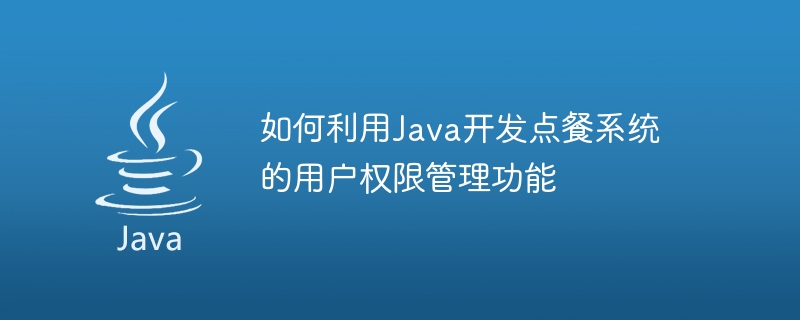Home >Java >javaTutorial >How to use Java to develop the user rights management function of the ordering system
How to use Java to develop the user rights management function of the ordering system
- WBOYWBOYWBOYWBOYWBOYWBOYWBOYWBOYWBOYWBOYWBOYWBOYWBOriginal
- 2023-11-01 18:21:551420browse

How to use Java to develop the user rights management function of the ordering system
With the rapid development of the Internet and mobile Internet, the ordering system has become more and more popular . Since the food ordering system involves users' sensitive information and financial transactions, user rights management is an essential function when developing a food ordering system.
When developing the user rights management function of the ordering system, we can use some tools and frameworks provided by Java to simplify the development process. The following will introduce how to use Java to develop the user rights management function of the ordering system.
1. Design the database table structure
First, we need to design the database table structure to store user information and permission information. Generally speaking, the user table contains fields such as user ID, user name, and password, and the permission table contains fields such as permission ID, permission name, and so on. In addition, a user permissions table also needs to be designed to store information related to users and permissions.
2. Create user classes and permission classes
In Java, we can create a user class and a permission class to represent users and permissions respectively. The user class contains attributes such as user ID, user name, and password, and the permission class contains attributes such as permission ID, permission name, and so on. In order to facilitate the management of user and permission information, we can use Java's object-oriented features, such as encapsulation, inheritance, and polymorphism.
3. Design user login and registration functions
User login and registration are one of the basic functions of the ordering system. When a user logs in, we need to verify whether the user's username and password are correct, and determine whether to allow the user to log in to the system based on the user's permission information. When a user registers, we need to save the user's basic information and assign an initial permission to the user.
4. Implementing the user rights management function
When implementing the user rights management function, we need to consider the following aspects:
1. Permission classification and inheritance
We can set different permission levels, such as administrator, store manager, waiter and customer, etc. At the same time, we can use the concept of permission inheritance to make certain permissions automatically inherit other permissions. For example, administrator permissions can inherit the permissions of store managers, waiters, and customers.
2. Permission verification
When the user operates the operating system, we need to perform permission verification on the user to ensure that the user has the corresponding permissions. For example, administrators can view and modify any user's information, while waiters and customers can only view and modify their own information.
3. Permission control
When the user operates the operating system, we need to control the functions and data that the user can access. For example, administrators can view and modify all menu and order information, while waiters and customers can only view and modify their own related menu and order information.
4. Use Java development framework
In order to simplify the development process, we can use the Java development framework to implement user rights management functions. For example, Spring Security is a powerful security framework that provides a comprehensive user rights management solution that can be easily integrated into our ordering system and provides various functions and extension points.
Summary:
User rights management is an essential function when developing a food ordering system. When using Java to develop the user rights management function of the ordering system, we need to design the database table structure, create user classes and permission classes, design user login and registration functions, and implement user rights management functions. At the same time, we can use Java development framework to simplify the development process. Through reasonable design and use of Java technology, we can develop a safe and reliable ordering system and provide users with a good user experience.
The above is the detailed content of How to use Java to develop the user rights management function of the ordering system. For more information, please follow other related articles on the PHP Chinese website!
Related articles
See more- How to convert array to list collection in java?
- How to convert string to number in java
- How to implement user rights management function in takeout system
- Detailed explanation of the order evaluation function in the food ordering system developed with Go language
- Implementation method of dish recommendation function in food ordering system developed with Go language

